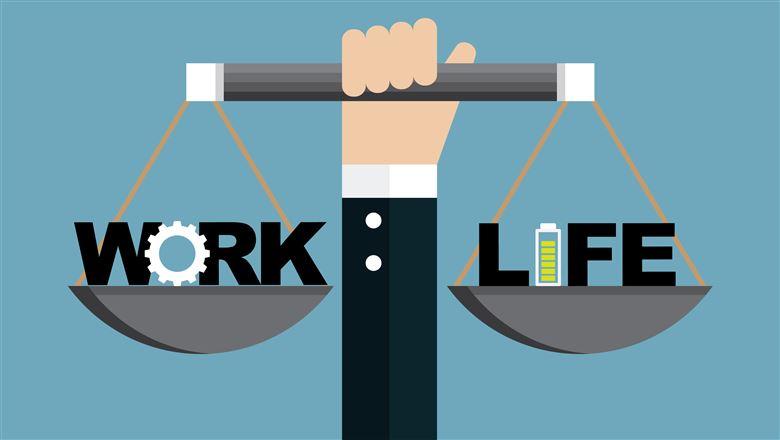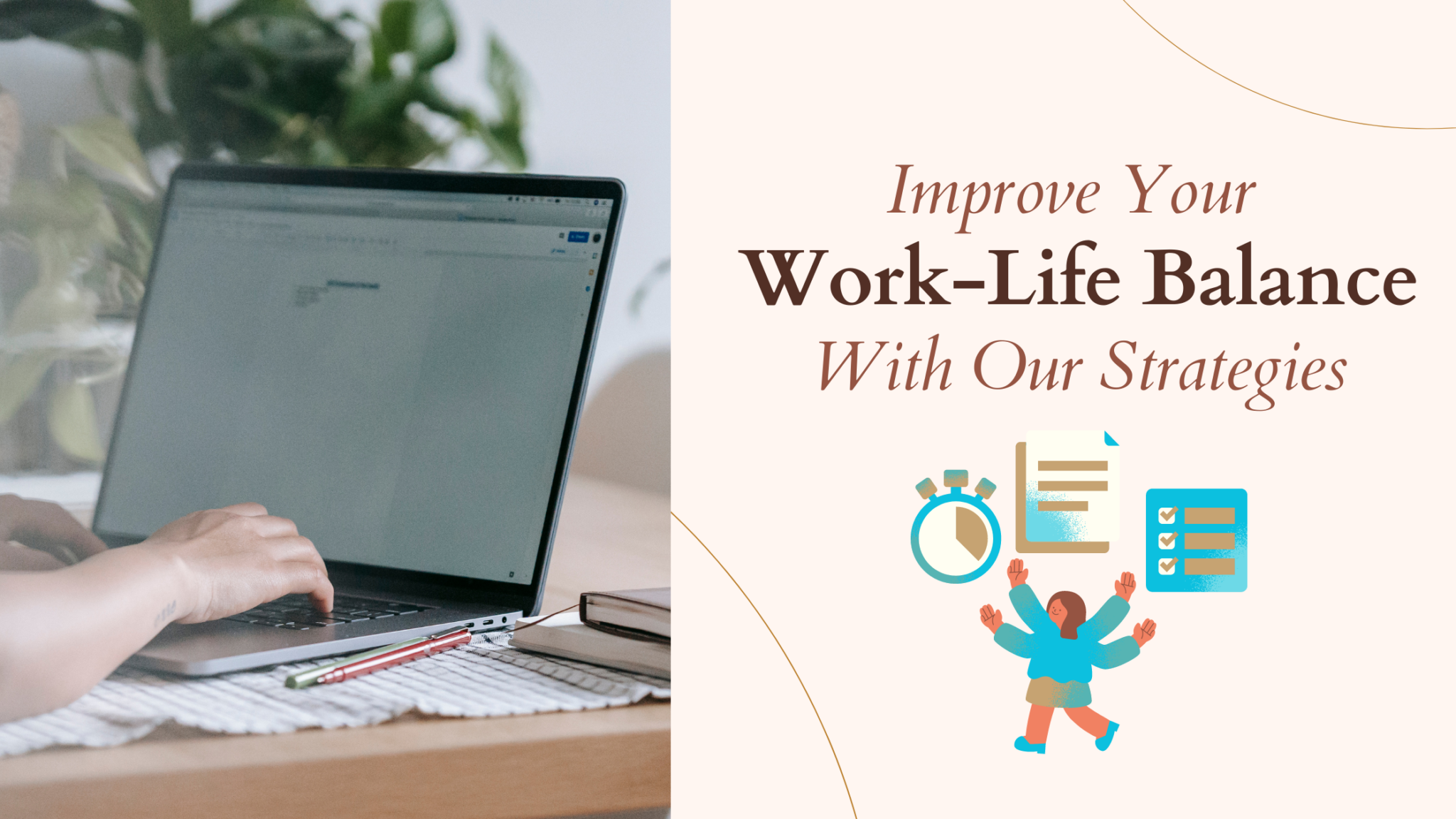Work-life balance is not just a passing trend; it’s an essential aspect of living a fulfilling and satisfying life. Achieving this delicate equilibrium means finding the perfect blend between your professional commitments and your personal well-being, encompassing everything from family to hobbies, self-care, and leisure activities.
An imbalanced work-life equation can lead to heightened stress levels, burnout, decreased productivity at work, strained relationships with loved ones, and negative impacts on physical health. On the flip side, when you successfully strike that balance, you unlock a world of benefits.
One of the most significant advantages of achieving a healthy work-life balance is improved mental health. By prioritizing time for yourself outside of work demands, you give your mind space to recharge and rejuvenate. This results in reduced stress levels and an overall sense of well-being that permeates every aspect of your life.
Maintaining a good work-life balance allows for better focus during working hours. By setting clear boundaries between professional obligations and personal time, you prevent distractions from seeping into each other’s domains. The outcome? Increased productivity at work coupled with quality moments spent with loved ones.
A balanced lifestyle also promotes optimal physical health outcomes. When individuals make regular time for exercise or engage in activities they enjoy beyond their careers or jobs, it positively contributes to their overall fitness levels. This holistic approach ensures that both body and mind are nurtured, resulting in enhanced well-being across all areas of life.
Identifying Your Personal and Professional Priorities
Achieving a harmonious balance between your work and personal life is not just a luxury but an essential component for overall well-being and success. It’s about finding that perfect equilibrium that allows you to effectively manage your time, energy, and priorities. Here are some invaluable insights on how to strike the right balance:
- Understanding the Concept of Work-Life Balance
- Work-life balance goes beyond simply juggling work responsibilities and personal commitments; it’s about integrating them seamlessly.
- It means having quality time for family, friends, hobbies, self-care activities, and other non-work-related pursuits while still excelling in your career.
- Achieving work-life balance involves finding a distribution that aligns with your values and goals rather than dividing your time equally between both realms.
- The Consequences of Neglecting Work-Life Balance
- Disregarding work-life balance can lead to heightened stress levels, burnout, decreased productivity, strained relationships with loved ones, and compromised physical health – all leading to reduced overall satisfaction in life.
- Prolonged neglect of work-life balance may even result in job dissatisfaction or hinder career growth.
- The Benefits of Striking a Healthy Work-Life Balance
- Improved Mental Health: Achieving harmony between work and personal life results in better emotional well-being as stress levels decrease and relaxation increases.
- Enhanced Productivity: Allowing ample time for restorative activities outside of work rejuvenates you mentally, making you more focused when returning to your professional endeavors.
- Stronger Relationships: Prioritizing personal commitments nurtures deeper connections with family members, friends, and partners or spouses.
- Better Physical Health: Maintaining a balanced lifestyle positively impacts your physical well-being by providing opportunities for exercise routines, healthy eating habits, and sufficient sleep.

Strategies for Achieving Work-Life Balance
One of the main reasons why achieving work-life balance is essential is because it directly impacts your overall health. Numerous studies have shown that individuals who maintain a good balance between their careers and personal lives are more likely to have better mental health, lower stress levels, improved relationships, and even enhanced job performance. So how can you achieve this delicate equilibrium? Here are some expert tips.
Mastering Time Management
Effective time management lies at the core of achieving work-life balance. Start by identifying your most important tasks and prioritize them accordingly. Utilize tools such as calendars or task management apps to schedule your activities, ensuring dedicated time slots for both work-related tasks and personal endeavors.
The Power of Delegation
One key aspect often overlooked is learning to delegate tasks whenever possible. Recognize that you don’t have to shoulder everything on your own, especially if there are capable team members or colleagues who can assist you. By delegating tasks, not only do you lighten your workload but also empower others in the process.
Setting Realistic Goals
It’s crucial to set realistic goals for yourself, both professionally and personally. Avoid overcommitting or taking on more than what you can handle; doing so often leads to stress and burnout. Instead, break down larger goals into smaller manageable steps that allow room for celebrating small victories along the way.
Establishing Clear Boundaries
Maintaining a healthy balance between work life and personal life requires setting clear boundaries between these two domains. Clearly define working hours and communicate these boundaries with colleagues or clients so they understand when it’s appropriate to contact you outside those designated times.
Prioritizing Self-Care & Relaxation
Make self-care activities that promote relaxation and rejuvenation a top priority in your daily routine – whether it’s engaging in regular exercise, practicing meditation techniques, pursuing hobbies that bring joy into your life, or spending quality time with loved ones.
Seeking Support
Don’t hesitate to seek support from friends, family members, or even professional counselors if needed. Working with someone who specializes in helping individuals achieve work-life balance can provide valuable insights and guidance tailored to your unique circumstances.
Learning the Art of Saying No
It’s crucial to learn how to say no when necessary. Understand that you cannot do everything, and it’s perfectly acceptable to decline certain requests or opportunities if they don’t align with your priorities or values.
Flexibility & Adaptability
Embrace flexibility and adaptability both in your personal and professional life. Recognize that circumstances may change unexpectedly, and being open to adjusting your plans or strategies will help you maintain balance during challenging times.

Leveraging Technology for Work-Life Balance
Work-life balance is essential for maintaining a healthy and fulfilling life. Achieving this delicate balance can be challenging, but with the help of technology, it becomes more manageable.
Embrace Productivity Apps
To effectively manage your tasks and stay organized, leverage the power of productivity apps. These incredible tools offer features such as task lists, reminders, and project management capabilities. By utilizing these apps wisely, you can prioritize your work efficiently and ensure nothing falls through the cracks.
Utilize Time-Tracking Tools
Gain valuable insights into how you spend your time by using time-tracking tools. These innovative solutions allow you to monitor activities throughout the day and identify areas where adjustments are needed for better balance. Whether it’s spending too much time on non-essential tasks or neglecting important aspects of your personal life, these tools will empower you to make necessary changes.
Automate Repetitive Tasks
Say goodbye to mundane chores! Technology offers automation solutions that streamline repetitive tasks at work or home. From automating email responses to data entry processes, these tools free up precious time that can be dedicated to more meaningful endeavors in both your professional and personal spheres.
Set Digital Boundaries
In our hyper-connected world filled with constant notifications from smartphones and social media platforms, setting digital boundaries is crucial for maintaining work-life balance. Designate specific hours during which you will not engage with work-related emails or messages unless it is an emergency situation demanding immediate attention. By creating this separation between work-related communication and personal time, you’ll reclaim control over your own schedule while still being responsive when necessary.
Practice Digital Detoxes
Taking regular breaks from technology is essential for preserving mental well-being and achieving true balance. Consider implementing “tech-free” periods during your day or weekends where you disconnect from devices entirely and focus on rejuvenating activities like spending quality time with loved ones or pursuing hobbies. By stepping away from screens, you’ll recharge your mind and soul, allowing for a more fulfilling work-life integration.
Explore Remote Work Opportunities
Thanks to advancements in technology, remote working has become increasingly accessible. If it aligns with your job responsibilities, discuss the possibility of working remotely part-time with your employer. This flexibility not only saves valuable commuting time but also allows for increased quality time spent with family or pursuing personal interests. Remote work offers a unique opportunity to blend career aspirations with personal fulfillment.
Prioritize Self-Care
Technology can be an invaluable tool when it comes to prioritizing self-care activities. From guided meditation apps to fitness tracking tools and sleep monitoring features, there are countless resources available at our fingertips. Incorporate these tools into your routine to ensure that you’re taking care of both your physical and mental well-being while juggling the demands of work and personal life.
Taking the First Step Towards Work-Life Balance
Feeling overwhelmed by the constant juggling act between your work and personal life? Don’t worry, you’re not alone. Achieving a balanced lifestyle is a journey that requires commitment and effort, but with the right strategies in place, it’s absolutely attainable. Here are some expert tips to help you take that first step towards work-life balance:
- Embrace Consistency: Consistency is key when it comes to achieving work-life balance. It’s not just about making small changes; it’s about committing to a new way of living that prioritizes both your personal and professional needs.
- Practice Patience: Rome wasn’t built in a day, and neither will your ideal work-life balance be achieved overnight. Be patient with yourself as you navigate through this transformative process.
- Set Realistic Goals: Start by setting realistic goals for yourself regarding how much time you want to dedicate to work versus personal activities. This will serve as your compass during decision-making moments and ensure effective time allocation.
- Establish Clear Boundaries: Creating boundaries between your work life and personal life is crucial for maintaining equilibrium. Designate specific times when you’ll be fully present at work while also carving out quality moments for relaxation, family time, hobbies, or self-care activities.
- Prioritize Self-Care: Taking care of yourself should always be at the top of your priority list if you want to achieve true work-life balance. Make sure to prioritize self-care activities such as exercise, meditation, sufficient sleep, or engaging in hobbies that bring joy into your life – they are essential ingredients for overall well-being.
- Utilize Technology: Leverage the power of technology to streamline your workflow and stay organized both at work and in your personal life. Productivity apps or task management software can be game-changers when it comes to optimizing efficiency.
- Seek Support from Others: Don’t hesitate to reach out for support from friends, family members, or colleagues who have successfully achieved their own work-life balance. Their valuable insights, advice, and encouragement will provide you with the motivation needed along this journey.
- Reflect and Adjust: Regularly reflect on your progress and make adjustments as necessary. Remember that work-life balance is not a one-size-fits-all concept – what works for someone else may not necessarily work for you. Continuously evaluate what’s working well and what needs refinement.
By implementing these expert strategies into your daily routine, you’ll be well on your way to creating a more fulfilling and harmonious life. Start today by taking that first step towards achieving work-life balance – the positive impact it will have on your overall well-being is immeasurable!




